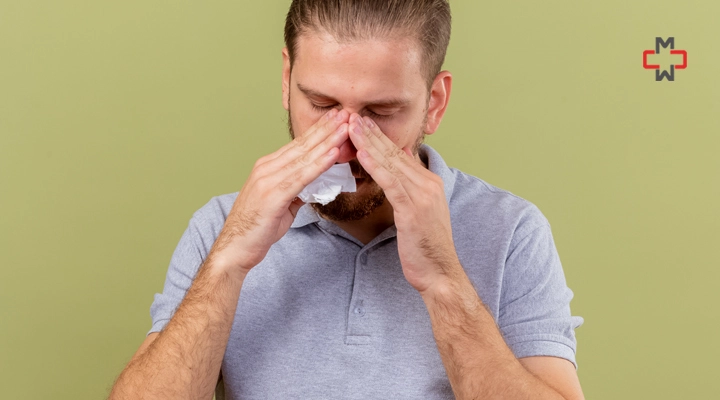Quick Answer: To help drain sinuses, try using steam inhalation, nasal irrigation, and warm compresses.
If you’re dealing with sinus pressure, nasal congestion, or that all-too-familiar facial heaviness, you’re not alone. Over 28.9 million adults in the United States are diagnosed with sinus infections each year, according to the CDC. At Manhattan Medical Arts, we see patients daily seeking fast, effective ways to relieve sinus pressure and restore comfortable breathing.
Dr. Syra Hanif, our board-certified Primary Care Physician, has helped countless New Yorkers find relief from sinus pain, chronic sinusitis, and lingering postnasal drip using both advanced diagnostics and trusted home care strategies.
What Causes Sinus Congestion and Pressure?
Sinuses are air-filled spaces in the skull — including your frontal sinuses, maxillary sinuses, ethmoid sinuses, and other paranasal sinuses. When inflamed due to a sinus infection, allergy, or nasal polyps, these sinus cavities swell, trap mucous secretions, and block nasal passages, creating painful sinus pressure and facial pain.
Common Triggers:
- Upper respiratory infections (cold, flu)
- Seasonal or environmental allergies
- Bacterial sinus infections or fungal infections
- Structural issues like a deviated septum or nasal growths
Home Remedies That Help Sinuses Drain Naturally
When caught early, these home remedies can help reduce inflammation, allow fluid drainage, and open nasal passages:
1. Nasal Irrigation (Called Nasal Lavage)
A nasal saline spray, neti pot, or sinus rinse clears out allergens, dust, and excess mucus. This method — also known as saline irrigation — is recommended by the FDA and NIH.
- Use sterile or distilled water
- Keep the device clean
- Repeat 1–2 times daily during flare-ups
2. Steam Inhalation or Hot Showers
Breathing moist air thins mucus and reduces inflammation in the nasal membranes. Place a towel over your head and breathe over hot water, or take a long hot shower.
3. Apply Warm Compresses
A warm compress across your cheeks and forehead boosts blood flow, relaxes tight tissues, and encourages mucus drain. For added comfort:
- Alternate with a cool compress
- Repeat several times a day
4. Drink Fluids & Avoid Alcohol
Hydration helps dilute mucous secretions and improves sinuses drain function. Limit drinking alcohol, which dehydrates and thickens mucus.
5. Use Nasal Sprays and Oral Decongestants
- Over the counter medications like nasal sprays (oxymetazoline) can open nasal passages, but limit to 3 days to avoid rebound congestion.
- Oral decongestants (with caution if you have high blood pressure)
How to Use Sinus Massage to Promote Drainage
Sinus massage helps release tension, boost circulation, and encourage fluid drainage from congested areas.
Key Pressure Points:
- Frontal Sinuses: Gently press between your eyebrows
- Maxillary Sinuses: Massage under your cheekbones
- Nose Bridge: Small circular motions to relieve swelling
Repeat these massage pressure points with a light touch — think “penny-weight pressure” — to ease sinus discomfort and facial pressure.
✅ Need Relief That Lasts? Book an Online or Virtual Appointment with Dr. Syra Hanif
When It’s More Than Just a Cold: Testing & Diagnosis
At Manhattan Medical Arts, we use precise diagnostics to evaluate sinus issues and determine if you’re dealing with:
- Acute sinusitis (lasting days to weeks)
- Chronic sinusitis (lasting 12+ weeks)
- Bacterial sinus infection vs. viral sinus infection
- Allergic response or structural problem like nasal polyps
In-Clinic Testing May Include:
- Nasal endoscopy
- Imaging (CT scan)
- Swab cultures
- Allergy testing
Testing helps us customize care and explain your results clearly, whether your sinus pain stems from inflammation, infection, or allergy.
When to See a Doctor
See a physician if you experience:
- Sinus congestion longer than 10 days
- Fever, facial pain, or discolored discharge
- Recurring sinus infections or worsening sinusitis symptoms
- Changes in vision or swelling around the eyes
Let us help you relieve sinusitis symptoms with a care plan that matches your body — and your lifestyle.
✅ Need to walk in today? Book Your In-Person Visit Now
How to drain sinuses FAQs
How do you manually drain your sinuses?
Use a neti pot, steam inhalation, or perform a sinus massage using light pressure on key pressure points like the cheekbones and between the eyebrows.
How can I unblock my sinuses fast?
Try a warm compress, a hot shower, nasal sprays, and drink fluids to loosen mucus.
What pressure points drain sinuses?
Points near the frontal sinuses, maxillary sinuses, and nose bridge can be gently massaged to help your sinuses drain naturally.
How do I get rid of sinus drainage ASAP?
Use nasal saline spray, stay hydrated, apply heat, and talk to your doctor if sinus drainage persists.
✅ Prefer a virtual consultation? Book a Virtual Appointment Now
Final Words from Dr. Syra Hanif
Whether it’s acute sinusitis, chronic sinusitis, or recurring sinus infections, our clinic is here to support your long-term sinus health. Our experience treating thousands of New Yorkers with sinus problems gives us a unique edge in creating care plans that work — with or without prescriptions.
We use clinical testing, home remedies, and lifestyle adjustments to relieve pressure, ease pain, and help your nasal cavity stay clear and healthy.
Medical Sources:
- Centers for Disease Control and Prevention (CDC)
- National Institutes of Health (NIH)
- Mayo Clinic
- JAMA: The Journal of the American Medical Association
Disclaimer
This blog is for information & educational purposes only and does not intend to substitute any professional medical advice or consultation. For any health-related concerns, please consult with your physician, or call 911.
-
About The Author
Dr. Syra Hanif M.D.Board Certified Primary Care Physician
Dr. Syra Hanif is a board-certified Primary Care Physician (PCP) dedicated to providing compassionate, patient-centered healthcare.
Read More







